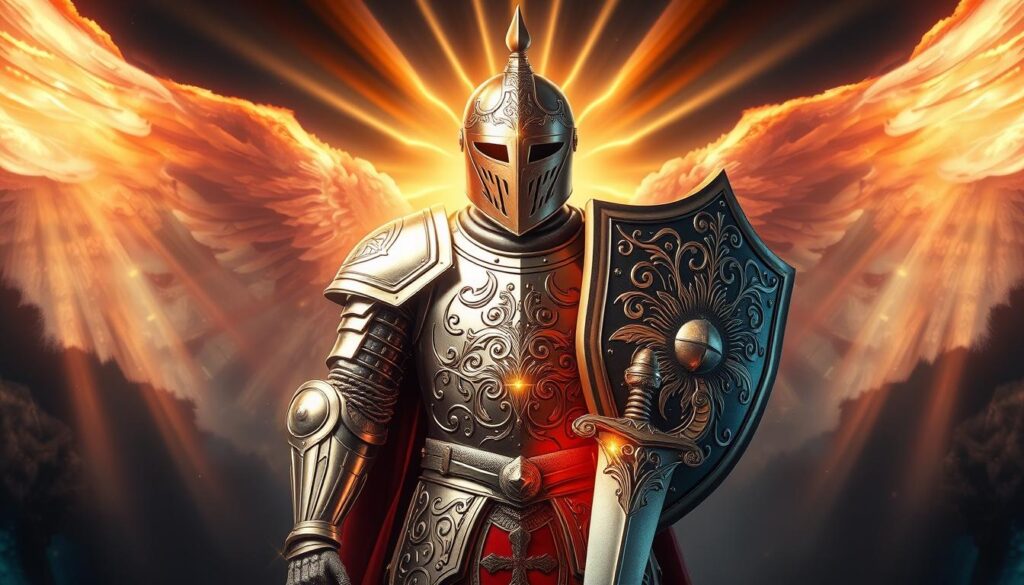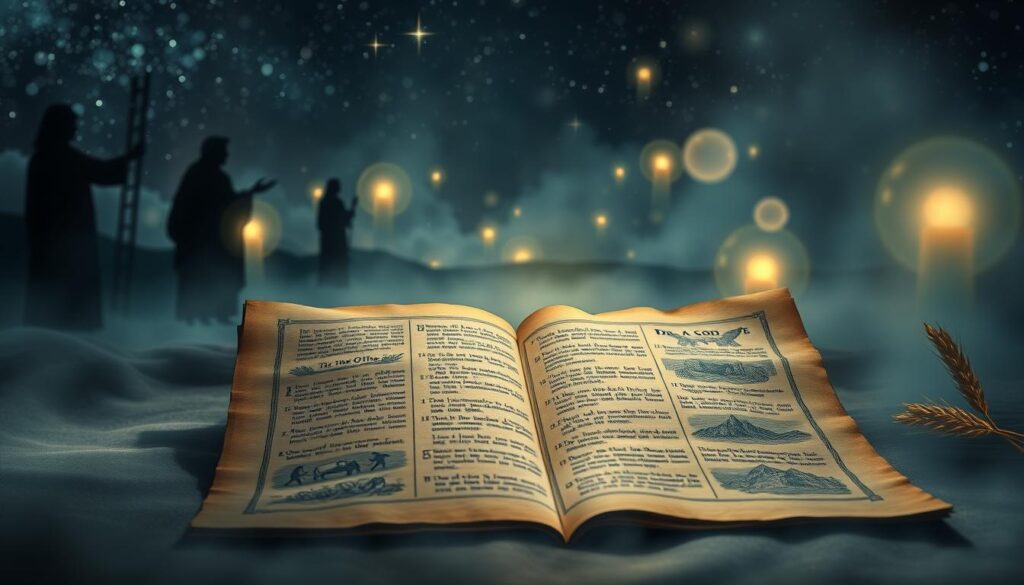Dream catchers are a symbol from Native American culture that many, including Christians, find interesting. The Bible doesn’t directly talk about dream catchers. Yet, by looking into their origins and the Bible’s views on spiritual symbols, we can learn a lot. But what does the Bible really say about these detailed weavings? How can Christians view them wisely and with discernment?
Key Takeaways
- Dream catchers started with the Ojibwe and Lakota Native American tribes.
- The Bible guides us on cultural practices and spiritual symbols, like in 1 Corinthians 8.
- Christians see dream catchers as cultural symbols, not spiritual objects.
- It’s key to respect others’ beliefs and not cause trouble for other believers.
- Being discerning and following your own conviction is important when dealing with symbols like dream catchers.
Introduction to Dream Catchers
Native American Origins and Symbolism
The dream catcher’s roots go back to the Ojibwe and Lakota tribes. These webbed circles are thought to catch bad dreams, letting good ones through to the sleeper. They symbolize the connection of all life and the cycle of life.
Purpose and Usage of Dream Catchers
Originally, dream catchers hung in windows or above beds to keep out bad vibes and ensure restful sleep. They were meant to shield the owner from harm. But, their fame has spread, with many types made and sold by New Age groups.
Many Native Americans see these dream catchers as too commercialized and wrongly used by outsiders. Yet, they also symbolize hope and healing in communities dealing with trauma.

Dream catchers have become a big hit, but their true meaning and history are often missed. As they remain popular, it’s key to honor their cultural roots and spiritual importance.
Dream Catchers and Biblical Perspectives
Dream catchers are not directly mentioned in the Bible. Yet, Christians look at them through the Bible’s teachings on spiritual symbols and God’s control. This leads to different views on dream catchers and Christianity. Some see them as cultural symbols, while others worry they might lead to idolatry or superstition.
Some Christians find connections between dream catchers and the Bible. They see the Dream Catcher as a symbol of God’s love for salvation. The feathers stand for the Trinity, and the sinew strand for Jesus and the Holy Spirit. The knots represent people, all connected.The Dream Catcher also reflects the Tsalagi (Cherokee) colors for the four directions. It has blue for the Spirit’s grieving, white feathers for forgiveness, and a blue stone for Jesus, the Chief Cornerstone.
Those who support dream catchers point to Bible verses like Psalms 91:4-6, Exodus 3:14-15, Matthew 28:19, and others to link them to Christian teachings. They say Colossians 3:14 shows love as the glue for everything. Ephesians 5:30 talks about believers being part of Christ’s Body, held together by His love. Hebrews 13:8 says Jesus is always the same, and Acts 2:17-18 mentions visions and dreams from the Holy Spirit.
But, others are cautious about dream catchers. They might see them as linked to occult practices or superstition. Most people might not know the true meaning of dream catchers, and they are linked to occultism. Some have gotten rid of their dream catchers after learning about occult practices.
The views on dream catchers vary, showing the mix of culture and Christian beliefs. Believers need to be careful and follow the Bible when dealing with these symbols.

“Dream catchers are commonly used in public school settings, with every classroom displaying at least one dream catcher, according to author Nanci Des Gerlaise.”
Dream catchers are popular in culture, making it important to think carefully and talk respectfully. Dream catchers are sold in stores, showing their popularity. Native American spirituality, including dream catchers, has become part of popular culture through the New Age movement.
By understanding the different views and biblical insights, Christians can handle the mix of culture and faith with care and wisdom.
What does the Bible say about Dream Catchers
The Bible doesn’t directly talk about dream catchers. But it gives clear advice on avoiding spiritual symbols and idolatry. It teaches Christians to trust in God’s power for protection, not in physical objects or superstitions.
Scriptural Guidance on Spiritual Symbols
The Bible strongly warns against worshiping idols and false gods. In Exodus 20:4-6 and 1 Corinthians 10:18-22, it says not to make or worship images or objects seen as gods. These verses warn of the dangers of idolatry and how it can lead people away from true faith.
The Armor of God as Spiritual Protection
Instead of dream catchers, the Bible tells Christians to wear “the full armor of God” as in Ephesians 6. This armor includes the belt of truth, the breastplate of righteousness, and the sword of the Spirit. It shows the believer’s protection through faith, God’s Word, and the Holy Spirit’s power. By trusting in God’s power, Christians can find real security and understanding, without needing superstitious objects or practices.

The Bible’s teachings on spiritual symbols and God’s power for protection are clear. Christians should be wise and discerning about dream catchers and other cultural practices. By staying grounded in scripture and Jesus’ teachings, believers can handle these complex issues with grace and conviction.
Dreams and Visions in the Bible
The Bible shows dreams as a way for God to talk to us. Figures like Joseph and Old Testament prophets got wisdom from their dreams. In the Old Testament, dreams were a way for God to send messages, but it was important to know the real ones from just dreams.
The New Testament also values dreams. Angels used visions to share important news, like in Joseph’s story and Acts 2.
Old Testament Dreams and Interpretations
The Bible is full of stories where dreams helped people understand God’s plans. Joseph’s dream about Pharaoh’s cows led to his rise in Egypt. The Old Testament prophets, like Daniel, also got messages from dreams and visions.
But the Bible warns against making idols or using objects for spiritual guidance. It says we should only worship God and not make images. Instead, we should trust God and seek His wisdom through prayer and His Word.
| Old Testament Verses on Dreams and Visions | Significance |
|---|---|
| Genesis 40:8, 41:25 | Joseph’s interpretation of dreams |
| Numbers 12:6, Genesis 42:9 | God speaking through dreams |
| 1 Samuel 28:15, Deuteronomy 13:1 | Prophets and dreams |
| Isaiah 29:7-8, Ecclesiastes 5:7 | Consequences and vanities of dreams |
| Zechariah 10:2, Jeremiah 23:32 | Condemnation of false dream prophets |
The Bible’s view on dreams and visions helps us understand spiritual experiences. It guides us in knowing God’s will.

Native American Spirituality and Christianity
The bond between Native American spirituality and Christianity is about respecting different cultures and beliefs. Dream catchers, a key part of Native American traditions, show a deep bond with nature and the unknown. Christians should handle these symbols with care and understanding, valuing other beliefs while staying true to their own faith.
Cultural Intersection and Respect
The Bible teaches us to respect others’ beliefs while keeping our own. Dream catchers, though not in the Bible, teach us about respecting different views and not causing trouble for others. Christians should use wisdom and kindness when dealing with cultural symbols, making sure not to upset others.
It’s a tough task to balance respecting cultural traditions with staying true to the Bible. The dream catcher’s rise as a symbol of Native American culture shows the value of understanding and appreciation. But, groups like ISIS remind us of the harm caused by disrespecting cultural differences.
The changing meanings of symbols like the swastika teach us to be careful with cultural symbols. In the past, groups like the Quakers chose biblical names over pagan ones. Today, Christians must be wise and respectful when dealing with cultural symbols.

The connection between Native American spirituality and Christianity is about mutual respect and understanding. Dream catchers may not fit with the Bible, but respecting different beliefs and avoiding trouble for others is key. Christians should engage with these symbols with wisdom, respect, and a true wish to connect and understand.
Dream Catchers in Contemporary Culture
Dream catchers, once sacred in Native American culture, are now everywhere. They were made from willow wood, feathers, and webs. They were thought to catch bad dreams and let good ones through. Now, they’re mostly used for decoration and sold as items.
Many dream catchers are made quickly in different shapes and colors. This has made some Native Americans upset, seeing it as cultural theft. Yet, others see it as a chance to share their heritage. It’s key to know if dream catchers are art or spiritual symbols, especially for Christians.
| Dream Catcher Designs | Symbolic Meaning |
|---|---|
| Circular Dream Catchers | Represent peace and harmony |
| Teardrop Dream Catchers | Signify good luck and fortune |
| Heart-Shaped Dream Catchers | Symbolize joy, love, and emotional healing |
| White Dream Catchers | Represent serenity and cleanliness |
| Black Dream Catchers | Indicate sophistication and protection from negative energies |
| Multicolored Dream Catchers | Combine energies from various hues such as red, blue, yellow, and green |
New dream catcher designs are popping up, each with its own purpose. For example, protection dream catchers use feathers and stones to ward off bad vibes. Healing dream catchers, on the other hand, use crystals to help with physical and mental health.
As dream catchers evolve in today’s world, Christians should be careful. It’s crucial to understand their spiritual meaning. Misusing or misunderstanding these symbols can lead to spiritual harm or disrespect.
“Dream catchers have become a way for people to connect with Native American culture, but it’s important to understand their true meaning and significance.”
Discernment and Personal Conviction
As Christians, we must use Christian discernment with spiritual symbols like dream catchers. The Bible doesn’t directly say we can’t use dream catchers. But it warns us against idolatry and tells us to trust in God, not objects.
1 Corinthians 8 teaches us that owning a dream catcher might depend on our personal conviction. It also considers how it might affect others’ faith. We should think about how our choices might impact those around us.
Christian Views on Symbolism and Idolatry
The Bible warns us about symbolism that could lead to idolatry. We must worship only God, not created things.
Dream catchers might have cultural value, but we must check if they fit with our faith. We need to see if using them aligns with biblical teachings or might distract us or others.
“You shall have no other gods before me.” – Exodus 20:3
This command from God tells us to focus only on Him. We should avoid anything that could split our loyalty or devotion.
When dealing with cultural differences and personal expression, we need to seek wisdom from the Bible. We should rely on the Holy Spirit to guide us. By keeping our focus on Christ, we can honor God and respect different beliefs.
Navigating Cultural Differences with Grace
Christians should handle cultural practices like dream catchers with care and kindness. They must understand and respect the deep meaning of these symbols in Native American spirituality. This requires careful thought, empathy, and a commitment to understanding, not judging, others’ beliefs.
Respecting Beliefs While Upholding Faith
Dealing with cultural differences is complex but crucial for believers to do with wisdom and compassion. The text stresses the need for unity in the Church and the impact of isolation. It encourages moving beyond partisan views and embracing grace for solving social problems.
The text talks about the importance of balance when interacting with different cultures and the risks of isolation. It points out the Church’s role in reconciliation and believers’ duty as ministers of peace. It also emphasizes Jesus’ mission to build a Kingdom, not just a religion.
Dreams in the text show hopes for unity, humility, and spiritual growth. By respecting others’ beliefs and navigating cultural differences with grace, Christians can strengthen their faith and promote unity.
“Gracious words are a honeycomb, sweet to the soul and healing to the bones.” – Proverbs 16:24 (NIV)
The text explores personal growth, including overcoming judgmental tendencies. It references Bible verses in different translations, focusing on dreams and overcoming life’s barriers.
By being gracious, respecting others, and staying true to their faith, Christians can bring people together and grow spiritually.
The Power of Prayer and Trust in God
The Bible tells us to trust in prayer and God’s care, not in physical symbols. It teaches us to follow its teachings, not to mix them with cultural symbols like dream catchers.
2 Thessalonians 3:3 reminds us that God is faithful and will protect us from evil. This shows us that faith in God is the best way to feel safe and secure, not relying on other practices.
“But the Lord is faithful, and he will strengthen you and protect you from the evil one.” – 2 Thessalonians 3:3
The Bible teaches us about the power of prayer and trusting in God’s protection. It warns against occult practices and talking to mediums, urging us to follow biblical teachings.
By trusting in God and praying, we can find real spiritual protection and guidance. This way, we don’t rely on cultural symbols that go against the Bible.
The Bible guides us on prayer and trust in God, helping us through cultural and spiritual challenges. By living according to biblical principles, we find the protection and guidance we need, based on God’s love and faithfulness.
Dream Catchers as Cultural Art or Spiritual Symbols
The view of dream catchers varies widely. Some see them as cultural art and a part of Native American heritage. Others view them as spiritual symbols that might affect Christian beliefs. This difference is crucial for Christians, who must balance their appreciation for dream catchers with their faith.
In many Native American tribes, dream catchers are deeply meaningful. They are seen as filters for negative dreams and energies, protecting against bad nights. Yet, the Bible does not mention dream catchers, leading Christians to be cautious.
The Bible teaches to align beliefs with its teachings. This means Christians should think carefully about using dream catchers in their faith. It’s important to understand dream catchers in the context of the Bible and to respect cultural differences.
| Potential Concerns with Cultural Symbols | Scriptural Guidance |
|---|---|
|
|
Dream catchers hold deep cultural and historical value for Native American communities. Yet, Christians must consider their spiritual implications. By being culturally sensitive and committed to their faith, Christians can honor both their heritage and beliefs.
The meaning of dream catchers varies widely, with 10 Native Americans giving 10 different answers. Originally from the Ojibway (Chippewa) tribe, they were used to protect children from nightmares. Now, they are found across many Indian reservations in the US and Canada.
Finding authentic Native American dreamcatchers is rare, as many are mass-produced. Yet, there are online resources that list American Indian craftspeople who sell genuine dreamcatchers.
“The Bible encourages believers to evaluate the compatibility of incorporating cultural symbols like dream catchers into their faith, underscoring the importance of cultural sensitivity and respectful dialogue within the Christian community.”
In conclusion, dream catchers are seen as both cultural art and spiritual symbols by Christians. Understanding their cultural and historical significance while aligning with biblical teachings is key.
Ethical Considerations for Christians
Christians must think carefully about using cultural symbols like dream catchers. They should consider how these actions might affect others’ faith. The Bible, in 1 Corinthians 10, teaches us to be mindful of our choices. We should avoid actions that could lead others astray.
This means we should focus on building up the body of Christ. We should not let personal preferences or cultural appreciation come before the spiritual well-being of others.
Avoiding Stumbling Blocks for Fellow Believers
The Bible tells us to avoid practices that could harm others’ faith. It warns against engaging with mediums and contacting the dead in passages like Genesis 1:26-27 and Deuteronomy 18:9-14. The story of King Saul’s encounter with a medium shows the dangers of disobeying God’s commands.
As Christians, we must prioritize the unity and growth of the body of Christ. We should not follow personal preferences or cultural practices that might harm others’ faith.
Dream catchers come from Native American tribes, especially the Ojibwe people. But the Bible doesn’t mention them. Still, the Bible teaches us to align our beliefs with its teachings, which might make us think about dream catchers.
Dream catchers are believed to keep out negative dreams and energies. The Bible values dreams and their meanings. Yet, it warns against idolatry and putting anything above God. This could conflict with the spiritual meaning of dream catchers.
Christians should be careful with dream catchers. They might be seen as a way to appreciate culture. But they are also believed to have protective powers and connect us to something greater, like divine communication. This raises questions about honoring God’s commands and the spiritual well-being of believers.
| Key Insights | Scriptural References |
|---|---|
| The Bible warns against engaging with mediums and contacting the dead | Genesis 1:26-27, Deuteronomy 18:9-14, Leviticus 19:31, Leviticus 20:6-8, Leviticus 20:27, 1 Samuel 28:3-19 |
| Dream catchers are believed to have spiritual and protective properties | N/A |
| The Bible emphasizes the importance of aligning beliefs and practices with its teachings | N/A |
| Christians must exercise discernment and consider the potential impact on fellow believers | 1 Corinthians 10 |
When dealing with dream catchers, Christians need to be discerning. They should focus on the unity and spiritual health of the body of Christ. By doing this, they can appreciate diversity while staying true to their faith and avoiding harm to others.
Conclusion
The conclusion of our look into dream catchers and biblical principles shows the importance of cultural understanding and discernment in the Christian faith. Dream catchers, a key Native American symbol, may not be directly mentioned in the Bible. Yet, the biblical principles of avoiding idolatry, seeing spiritual battles, and trusting in God’s protection guide us.
As the Christian community interacts with various cultural practices, it must hold its faith firm. At the same time, it should create a space of grace and mutual understanding. This way, believers can honor and value the diversity of cultural traditions without losing sight of their Christian faith.
In the end, our journey highlights the critical role of biblical principles, cultural understanding, and a strong Christian faith in dealing with dream catchers and other cultural symbols. As we face these challenges, our commitment to honoring God, respecting others, and sharing the Gospel’s power must remain unwavering.
FAQ
What are dream catchers and where did they originate?
Dream catchers are webbed circles with beads and feathers. They come from the Ojibwe (Chippewa) and Lakota tribes. These tribes believe they catch bad dreams in their web, letting good dreams slide down the feathers to the sleeper.
What is the biblical perspective on dream catchers?
The Bible doesn’t directly talk about dream catchers. But Christians look at them through the Bible’s teachings on spiritual symbols and God’s control. This leads to different views on whether dream catchers fit with Christian beliefs.
How do the Bible and Christian faith view dreams and visions?
The Bible sees dreams as a way for God to talk to people. Joseph and Old Testament prophets got wisdom from dreams. The New Testament also shows dreams are important, with angels sharing vital messages through visions.
How do Christians balance cultural appreciation and spiritual discernment when it comes to dream catchers?
Christians should be careful and respectful when dealing with dream catchers. They should honor their meaning in Native American culture while staying true to their faith. This balance needs grace, understanding, and a desire to connect with others.
What biblical principles guide Christians in their use or display of dream catchers?
The Bible warns against idolatry and trusting in physical things more than God. 1 Corinthians 8 suggests that owning a dream catcher might depend on personal belief and how it affects others’ faith.
How can Christians navigate the ethical considerations surrounding dream catchers?
Christians should think about how their actions might influence others. They should avoid doing things that could make weaker believers doubt their faith. This means being careful, kind, and focused on strengthening the community of believers, not just personal likes or cultural appreciation.

